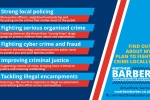
This Anti-Slavery Day (18th October) marks the first anniversary of the Victims First Willow Project; the Police and Crime Commissioner for Thames Valley’s service to support victims of slavery and exploitation.
Victims First Willow Project supports victims of all forms of exploitation including victims of modern slavery, human trafficking and other forms of exploitation such as those exploited by County Lines drug dealing. It works with victims and their families to provide crisis intervention, advocacy and long term practical and emotional support.
Since launch, the service has supported 445 victims of exploitation. Of those supported, 52% were male and 48% female, with the majority (74%) being British.
46% of victims supported by the Willow Project in its first year were victims of criminal exploitation which is the exploitation of a person to commit a crime for someone else’s gain. This includes exploitation by County Drug Lines, cuckooing and shoplifting. Other forms of exploitation experienced by victims included forced labour (13%), sexual exploitation (10%), financial exploitation (6%) and domestic servitude (1%).
The service also provides specialist support to victims of other forms of serious crime who have developed complex needs as a result. In its first year 21% of victims supported had complex needs.
Modern Slavery is a crime that can be difficult to detect and can go unreported. The latest Thames Valley Police figures reveal that there were 262 Modern Slavery crimes recorded in the Thames Valley between September 2018 and August 2019
Anthony Stansfeld, Police and Crime Commissioner for Thames Valley said “I launched the Willow Project due to the gap in support for victims of exploitation, and I am pleased to see so many victims being supported by the service within the first year.
“I welcome the increase in reporting of slavery and exploitation however, as a hidden crime we know that it is more prevalent than figures suggest.
“This Anti-Slavery Day I encourage people to be alert to the signs of slavery and exploitation in their communities and report any concerns to the Modern Slavery Helpline. It is clear from the Willow Project’s first year figures that many people in our communities are vulnerable to exploitation and it is important that we continue to identify these crimes and provide support to victims.”
Nicola Bell, Programme Manager for the Victims First Willow Project said “Exploitation is a heinous, often hidden crime which seeks out the most vulnerable people in our society. The launch of the Willow Project was crucial in enabling the identification and safeguarding of many potential victims and ensuring that their rights, needs and requirements were recognised.
“Our team has worked hard over the past 12 months to fill a much needed gap in the support provision for victims of exploitation; ensuring those victims get the best support and care, in what can be a long process, to help them regain their dignity and the confidence to make choices and move forward with their lives. We are delighted that with the support from Willow, over 400 people are now able to live a life that is not controlled by others and who are finally free from the grips of exploitation.”
Victims of modern slavery and exploitation can be referred to the Willow Project through Victims First on 0300 1234 148 or www.victims-first.org.uk
The signs of modern slavery to look out for include:
How do they look? Scruffy, dirty, malnourished, injured?
How are they acting? Anxious, afraid, reluctant to talk?
What’s their work situation like? Long hours, unsuitable clothing, wrong equipment?
How’s their accommodation? Overcrowded, poorly maintained, curtains always closed?
What are their movements like? Never leave the house alone, limited contact with friends and family, no access to money or identification?
For help, to seek advice or report a suspicion you can call the Modern Slavery Helpline on 08000 121700
You can contact Thames Valley Police on 101 to report an incident, or anonymously to Crimestoppers on 0800 555 111. If there is a crime in action or threat to life, call 999


